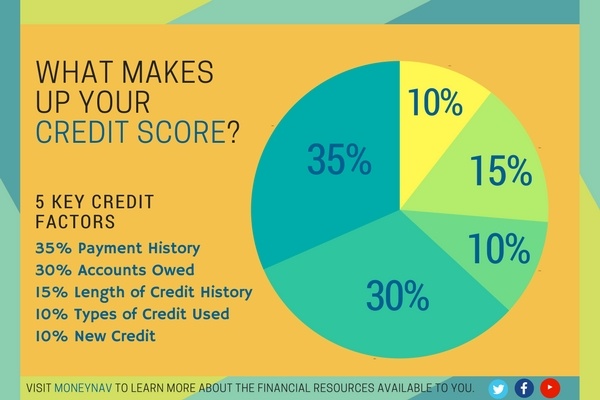Introduction
Welcome to my post on 5 ways to improve your higher credit! Having a good credit score is essential for financial success. It allows you to access loans, secure better interest rates, and even rent an apartment. In this post, I will share some valuable tips that can help you improve your credit score and maintain a higher credit standing.
Understanding the Importance of Higher Credit
Having a higher credit score opens doors to a world of financial possibilities. Lenders view individuals with high credit scores as trustworthy and reliable borrowers. This means you are more likely to be approved for loans, credit cards, and favorable interest rates. A higher credit score can also give you negotiating power when it comes to loan terms, ensuring better deals and saving you money in the long run.
Benefits of Having a Higher Credit Score
A high credit score brings numerous benefits. Firstly, you have access to more credit options with higher limits and lower interest rates. Additionally, it can help you secure better insurance rates, rent an apartment, and even land a job. A top-notch credit score demonstrates your financial responsibility, making you an attractive candidate for potential employers and landlords.
By implementing the following strategies, you can take control of your credit and work towards achieving a higher credit score. Remember, improving your credit takes time and effort, but the rewards are well worth it. So let’s dive into the five ways to improve your higher credit!

1. Assess Your Current Credit Standing
If you want to improve your credit score, it’s essential to begin by assessing your current credit standing. This step is crucial as it allows you to understand where you currently stand and identify areas that may need improvement. Luckily, there are a few simple steps you can take to assess your credit standing.
Obtaining Your Credit Report
Start by obtaining a copy of your credit report. You can request your report from the major credit bureaus: Experian, TransUnion, and Equifax. Remember, as a consumer, you have the right to receive one free credit report per year from each of these bureaus.
Analyzing Your Credit Score
Once you have your credit report, carefully analyze your credit score. Your credit score is a three-digit number that summarizes your creditworthiness. A higher credit score reflects better financial health. Look for any discrepancies or negative marks on your report that could be impacting your credit score negatively.
Identifying Areas for Improvement
After analyzing your credit score, you can identify specific areas that need improvement. Focus on factors like late payments, high credit utilization ratio, or outstanding debt. By addressing these areas directly, you can take steps to improve your creditworthiness and boost your overall credit score.
Assessing your current credit standing is the first step towards improving your higher credit. By obtaining your credit report, analyzing your credit score, and identifying areas for improvement, you are setting yourself up for success in enhancing your creditworthiness. Remember, building good credit takes time and effort, but the rewards are definitely worth it.

2. Pay Your Bills on Time
The Impact of Late Payments on Your Credit Score
Paying your bills on time is crucial when it comes to improving your higher credit. Late payments can have a significant negative impact on your credit score, making it harder for you to obtain loans and credit in the future. Even one late payment can lower your credit score, so it is important to ensure that all your bills are paid on time.
Setting Up Automatic Payments
One effective way to ensure that your bills are paid on time is to set up automatic payments. By doing so, you can relax knowing that your bills will be paid without any effort on your part. You can easily schedule automatic payments through your bank’s online banking system or by contacting your service providers. This method eliminates the risk of forgetting to pay a bill or being delayed due to busy schedules.
Creating a Monthly Budget
To stay on top of your bills and avoid late payments, it is essential to create a monthly budget. A budget helps you understand your income and expenses, allowing you to allocate funds for your bills before other expenses. By prioritizing your bill payments in your budget, you can ensure they are paid on time and avoid unnecessary late fees.
By paying your bills on time, setting up automatic payments, and creating a monthly budget, you will make significant strides toward improving your higher credit. So take control of your financial well-being today and watch your credit score soar!
3. Reduce Credit Utilization
Understanding Credit Utilization Ratio
One important factor that affects your credit score is your credit utilization ratio. This ratio refers to the amount of credit you are using compared to the total credit available to you. Ideally, you should aim to keep your credit utilization ratio below 30%. To calculate your credit utilization ratio, divide your total credit card balances by your total credit limit and multiply by 100%. For example, if you have a total credit limit of $10,000 and your current credit card balances amount to $3,000, your credit utilization ratio would be 30%.
Paying off High-Interest Debts First
To reduce your credit utilization ratio, start by paying off your high-interest debts first. By focusing on these debts, you can lower your overall credit card balances and improve your credit utilization ratio. This shows lenders that you are responsibly managing your credit and can positively impact your credit score.
Avoiding Maxing Out Credit Cards
Maxing out your credit cards is a common mistake that can harm your credit score. It increases your credit utilization ratio and suggests that you may be relying too heavily on credit. Instead, try to keep your credit card balances well below the credit limit to demonstrate responsible credit usage.
By implementing these strategies, you can effectively reduce your credit utilization ratio and improve your higher credit. Take the necessary steps to pay off high-interest debts first and avoid maxing out your credit cards. With patience and discipline, you will see positive changes in your credit score over time.
4. Maintain a Diverse Credit Mix
When it comes to improving your credit score, maintaining a diverse credit mix is crucial. This means having a combination of different types of credit accounts. By diversifying your credit portfolio, you can demonstrate to lenders that you can handle different forms of credit responsibly.
Types of Credit Accounts
To improve your credit, it’s important to have a mix of credit accounts, such as credit cards, loans, and mortgages. Each type serves a different purpose, and having a variety shows that you can manage different financial obligations effectively.
Balancing Between Revolving and Installment Credit
When managing your credit mix, it’s essential to find the right balance between revolving and installment credit. Revolving credit, like credit cards, allows you to borrow up to a certain limit and pay off the balance over time. On the other hand, installment credit, such as car loans, requires you to make regular fixed payments until the debt is fully repaid. By having a mix of both types, you can demonstrate your ability to handle different credit obligations.
Consider Opening New Credit Lines
Consider opening new credit lines to diversify your credit portfolio. However, it’s important not to go overboard and apply for too many new accounts, as this can negatively impact your credit score. Instead, focus on adding credit lines strategically and only when necessary.
maintaining a diverse credit mix is a key strategy in improving your credit score. By having a variety of credit accounts, finding the right balance between revolving and installment credit, and strategically opening new credit lines, you can demonstrate to lenders that you are a responsible borrower.
5. Monitor and Correct Errors on Your Credit Report
Importance of Regularly Monitoring Your Credit Report
One of the most essential steps in improving your higher credit is to regularly monitor your credit report. This helps you stay updated on your financial standing and ensures the accuracy of the information being reported. By reviewing your credit report on a regular basis, you can identify any errors or discrepancies that may negatively impact your credit score.
Identifying and Reporting Errors
When reviewing your credit report, pay close attention to any unfamiliar accounts, incorrect personal information, or questionable transactions. If you spot any errors, it is crucial to report them immediately to prevent further repercussions. Contact the credit reporting agency to dispute the errors by providing supporting documentation and a clear explanation.
Follow Up with Credit Bureaus
After reporting the errors, it is essential to follow up with the credit reporting agencies to ensure they investigate and resolve the issues promptly. Request documentation of the corrections made to your credit report for your records.
Regular monitoring and timely correction of errors on your credit report are key to maintaining a higher credit score. It demonstrates your financial responsibility and safeguards against inaccuracies that could harm your creditworthiness. By taking proactive steps to monitor and correct errors, you are ultimately reinforcing your creditworthiness and increasing your chances of accessing better financial opportunities.

Conclusion
Reaping the Benefits of a Higher Credit Score
Improving your credit score may seem like a daunting task, but with the right knowledge and strategies, you can achieve higher credit and enjoy the many benefits it brings. A higher credit score opens doors to lower interest rates, more favorable loan terms, and increased chances of loan approval. It can also help you secure better insurance rates, rental approvals, and even job opportunities.
Taking Small Steps for Big Improvements
To start your journey towards a higher credit score, focus on paying your bills on time, as this accounts for a significant portion of your credit score. Lenders consider your payment history when determining your creditworthiness. Another important step is to keep your credit utilization low. Aim to use no more than 30% of your available credit at any given time. Paying off debts, disputing errors on your credit report, and avoiding excessive new credit applications are also effective ways to boost your credit score.
By taking these small steps and being consistent in your efforts, you can gradually improve your credit score and reap the benefits that come with it. Remember, building good credit is a journey, not a sprint, so be patient and focused on your ultimate goal.
In conclusion, with dedication and a proactive approach, you can significantly improve your credit score. The benefits of a higher credit score are numerous, and it’s worth the time and effort to achieve it. Start implementing these strategies today, and before you know it, you’ll be enjoying the rewards of your hard work.